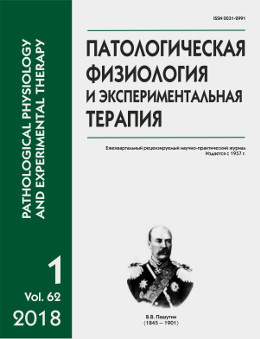Reprogrammed in vitro on m3 phenotype macrophages stop the growth of solid carcinoma in vivo
DOI:
https://doi.org/10.25557/0031-2991.2018.01.41-46Keywords:
reprogramming macrophages, solid carcinomaAbstract
Purpose of the study. The proof of the hypothesis that reprogrammed in vitro on M3 phenotype macrophages when injected into the body will substantially limit the development of solid carcinoma in vivo. Methods. The growth of a solid tumor was initiated in mice in vivo by subcutaneous injection of Ehrlich carcinoma (EC) cells. Injection of macrophages with a native M0 phenotype and with a reprogrammed M3 phenotype was performed in the region of solid EC formation. Reprogramming was performed with low serum doses, STAT3/6 and SMAD3 transcription factor blockers and lipopolysaccharide. Two schemes of macrophage administration were used: early and late. With early administration, macrophages were injected on days 1, 5, 10 and 15 after injection of EC cells by macrophage pricking all round on the four sides of the site of tumor development. With late administration, macrophages were administered on days 10, 15, 20 and 25. After 15 and 30 days after the introduction of EC cells, the solid tumor was excised and its volume was measured. The effect of macrophage administration was assessed qualitatively according to the visual and palpation characteristics of a solid tumor and quantitatively by the change in its volume compared with the group without the introduction of macrophages. Results. It has been established that M3-STAT3/6-SMAD3 macrophages with early administration from the onset of tumor development exert a pronounced antitumor effect in vivo, which was significantly greater than the antitumor effect of M3-STAT3/6-SMAD3 macrophages in late administration. Conclusion. The facts found in the work that M3 macrophages significantly inhibit the growth of solid carcinoma in vivo make it promising to develop a clinical version of the biotechnology of limiting tumor growth by pre-programming an antitumoral innate immune response in vitro.Downloads
Published
2018-01-25
Issue
Section
Original research
How to Cite
[1]
2018. Reprogrammed in vitro on m3 phenotype macrophages stop the growth of solid carcinoma in vivo. Patologicheskaya Fiziologiya i Eksperimental’naya Terapiya (Pathological physiology and experimental therapy). 62, 1 (Jan. 2018), 41–46. DOI:https://doi.org/10.25557/0031-2991.2018.01.41-46.






